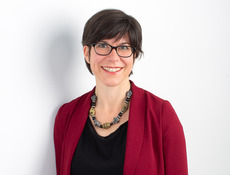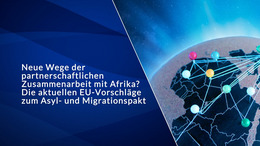Expedited by the fire in the Moria refugee camp on the Greek island of Lesbos, the European Commission presented a proposal for a “New Pact on Migration and Asylum” on September 23 that, in addition to offering a range of legislative proposals, is to serve as a basis for future cooperation with the African Union (AU) and African states, which are important countries of origin and transit for migrants and refugees. Within the framework of its EU Council presidency, Germany played a central role in the underlying negotiations and sought to set priorities that will extend beyond its term and into the Portuguese presidency, which started in January 2021. At the same time, the postponement of the EU-AU Summit until spring/summer 2021 provides the necessary space to identify and discuss issues relating to the partnership.
![[Translate to English:] Ein Mann und eine Frau sitzen vor einem Monitor und verfolgen die Zoom-Konferenz](/fileadmin/files/_processed_/0/3/csm_1433438026AdobeStock_354453812_KONZERN_ST-IB__f6c061ba8d.jpg)
© Kateryna - stock.adobe.com
“We need staying power”
Almost 50 representatives from politics, academia, civil society and organizations representing the African diaspora came together on November 18 for a digital lunchtime discussion of “New ways of partnering with Africa? Possibilities and limits of current EU proposals for the Pact on Migration and Asylum.” The event was organized by the project Making Fair Migration a Reality to examine pressing issues stemming from the migration and Africa policy currently being pursued by Germany and the European Union.
Between European pragmatism and the failure to recognize Africa’s realities
Victoria Rietig, head of the Migration Program at the German Council on Foreign Relations gave a substantive overview and pragmatic evaluation of the legislative proposal for a New Pact on Migration and Asylum. According to Rietig, the pact attempts to offer a compromise and create coherence between the European states, whose approaches to migration and asylum can differ markedly. However, many points in the proposed legislation remain unclear, Rietig said, especially in the areas of external relations and legal migration.
This was followed by two replies. First, Sylvie Nantcha, chairperson of TANG e.V. – The African Network for Germany, gave an overview of the African perspective. It was particularly striking that the proposal for the new pact was accepted without any reaction from the African continent. Nantcha attributed this, on the one hand, to the fact that the issue of internal migration is of much greater importance to African states than international migration and, on the other, to the Covid-19 pandemic, which has been greatly constraining nations confronted by existential issues. It was also significant, she said, that the EU had hardly consulted with African states and the AU on the proposed pact as it was being developed. She noted that, from the African perspective, a number of points posed difficulties in terms of their practical implementation, such as the screening of individuals at Europe’s external borders, the designation of safe third countries and, in particular, the strong focus on return migration, which is generally not in the interest of African states, which depend on remittances from their citizens living abroad. The pact must be adapted to reflect African realities, she said in conclusion.
Both Rietig and Nantcha called for mutual respect and for speaking and working with each other as equals – even if those often seem to be empty words – so the two sides can collaborate on migration policy in a sustainable and effective way. Both continents are fundamentally dependent on each other for the implementation of migration policy measures.
The second reply was given by Maximilian Popp, deputy head of the International desk at German newsweekly Der Spiegel. From the perspective of journalistic practice, he provided insights into human rights violations taking place on Europe’s external borders and painted a critical picture of a policy for “preventing migration” on the European side, while also pointing out constructive options for the future.
Possibilities for resolving a complex debate?
The discussion that followed was extremely lively and productive – which, as many participants noted, was unusual for such a format dedicated to a much-discussed topic like the proposed pact. Renowned experts actively contributed to the discussion, including Günther Burkhardt, managing director of the nonprofit Pro Asyl; Daniel Thym, professor of Public Law, European and International Law at the University of Konstanz; David Kipp from SWP, the German Institute for International and Security Affairs; Eduard Gnesa, former director of the Swiss Federal Office for Migration; Kamal Kassam from the German Federal Institute for Population Research; Bernward Ostrop from the German Caritas Association; and department heads and advisors from the Federal Foreign Office and the Federal Ministry for Economic Cooperation and Development.
Even if no conclusive approach has emerged for resolving what is a complicated debate and reality, the event did provide a number of important – and promising – possibilities going forward. It is important to highlight positive examples of how more balanced migration partnerships can be created – as Switzerland has done. Better partnerships should greatly expand the focus on return migration, including its preparation, embedding and reintegration, and, above all, anchor opportunities for the legal migration of different population groups. During the discussion, particular emphasis was put on vocational education partnerships as a sustainable model for all sides, even if it was clear that small pilot initiatives are by no means sufficient. An expansion of existing partnerships was also suggested, for example in exchange with the United States under the Biden administration. Germany is an important player in such approaches and, given its critical public, is certainly open to positive ideas on asylum and migration policy. “Staying power” is needed for negotiating a New Pact on Migration and Asylum, not to mention for developing cooperative partnerships with African states. At the same time, this extended process could provide precisely the space that is needed for an effective exchange. We will continue to report on further developments.
Speakers’ remarks are available here (video in German only).




